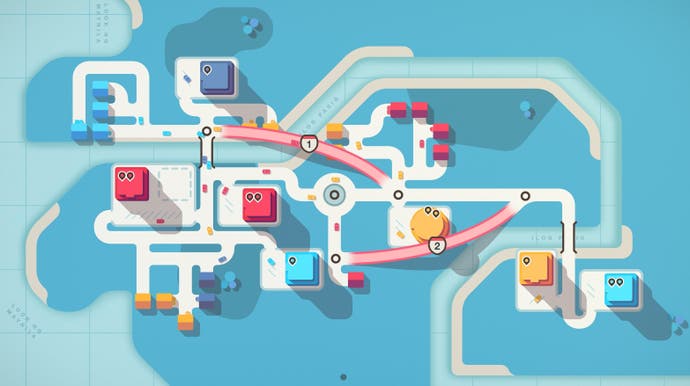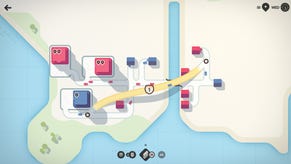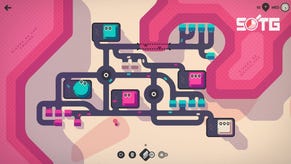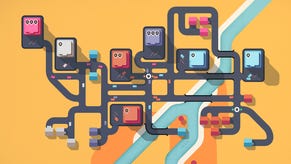Mini Motorways review - a city builder that balances precision and beauty
Where we're going...
Of all the imaginary people games ask me to care about, I think I care the most about the imaginary people who live in Mini Motorways' ghost homes. The terminology is mine, but if you played this game on Apple Arcade or have even the lightest of acquaintances with an enthusiast, you may know what I'm talking about.
Mini Motorways asks you to create a city purely by focusing on its roads. Roads connect big buildings, which I'll call businesses, where people presumably work or buy stuff, with little buildings, or homes, where people presumably live. The businesses demand people and the homes supply them and they both pop up all over the place, conveniently and inconveniently as you play. You have no say over this part. Instead, you build the roads that allow people to drive back and forth. Everything is colour-coded, so red businesses only want people who live in red homes. You score points for fulfilling demand. When businesses have too much unmet demand for too long, it means that your city has not worked very well and it's game over. Fine. So there are businesses and homes. But what about ghost homes?
Here is an early tip - one that feels illicit, practically shameful. Look at that relationship: all the demand in the businesses, all the supply in the homes. Guess what it means? It means these things are not equal; you do not have to connect every home that pops up if you want to keep the businesses happy. Because you only have a finite amount of road at any time, it may make sense to leave homes unconnected, to save your road for a time when you really need it. So these sad, unconnected homes I call ghost homes. They are in the city but they are not of the city. They are taking up space in the city, but they are not plugged into its rhythms and its circulation. What would it be like to live in a ghost home? Maybe it would be wonderful and freeing. Maybe it would be claustrophobic and terrifying; if you ran out of contact lens solution, I can imagine there would be problems. Maybe I am reading too much into it, reading too much into two rectangles of colour laid against each other, which the eye cannot help transforming, given the context, into the pitched roof of a modest little house.
The game begins properly when you start to see those two rectangles as a house, and when you see the slanted shadow around a business and realise that the business is big, a skyscraper, and you are clearly viewing it from above. You need to provide a little of the human magic to put Mini Motorways' abstract landscape together, because otherwise it's just beautiful iced tea colours - peaches and mints - while its soundtrack is a chilled tumbler of pips and muttering hums and clicks and whistles and honks, that are bird song, then traffic, then a kind of music of homeostasis the more you play.
All of which is to say: there are some games that you want to play the moment you see a screenshot of them. "Just look at those particle effects!" perhaps, or "I really do want to climb that mountain in the distance." Mini Motorways, like Mini Metro, the game that came before it, is a game I knew I had to play as soon as I saw it. I wanted to know how to turn these abstract shapes and colours into an activity. I wanted to be in the know about something so effortlessly beautiful and busy and refined.
Both Mini Metro and Mini Motorways are games about creating transit systems. Mini Metro has the glorious iconography of Harry Beck's London Tube Map to lean on - I have only just this second learned that Beck was an electrical draughtsman, but really it's all right there on the page isn't it? Mini Motorways uses roads and a handful of other symbols, but while you're playing both games in similar ways - drawing routes, matching shapes or colours, and dealing with supply and demand that you have no control over - both games could not be more different.
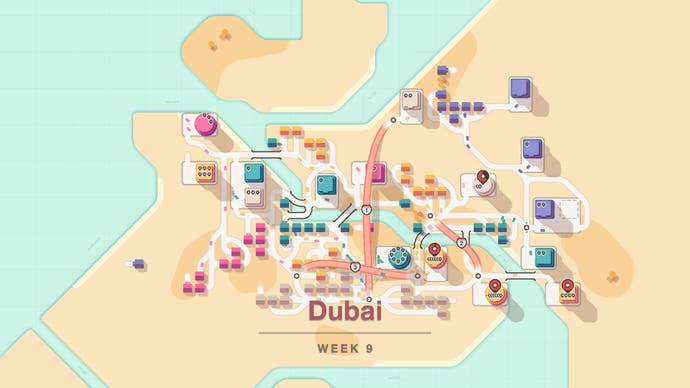
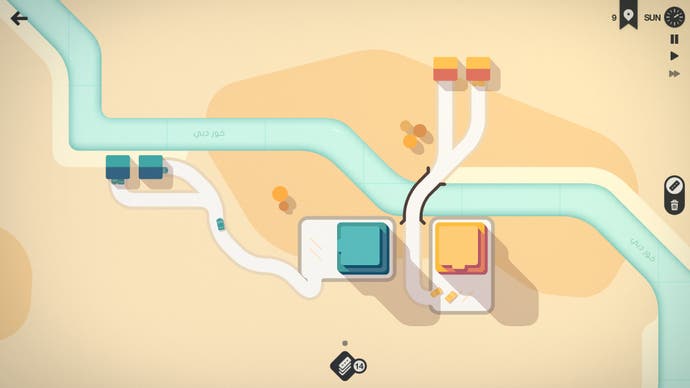
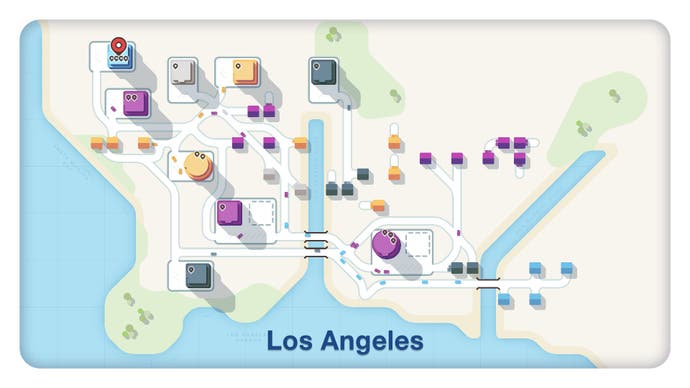
Mini Metro was about embracing range. Your stations were simple shapes and your job was to connect lines that covered as many shapes as possible, so that your passengers, who were also simple shapes, could always get to the matching station. Surely Mini Motorways is like that, right? Red houses and blue houses need to connect to their businesses, surely an elegant superhighway will allow you to cobble this together in no time.
But cars are not subway trains. In Mini Metro your trains ghost past each other in that whispering way that they do on the real tube - maybe a hint of flickering light in the distance, maybe a shudder or rush of wind. Compared to that, cars are a pain, frankly. Whack them on the same road and they all take up space. They bunch up and coagulate where they slow down at curves or crossings. It is hard to avoid metaphors when playing either of these games - the mind slips into analogy very easily, as it does I guess with real cities - and in Mini Motorways, it's very easy to fur the arteries and cause nasty blockages.
Bunched traffic is kind of beautiful here - a spilled domino rally of blues and greens and purples, with honking horns and panic building as the businesses tick closer to over-demand doomsday. But it's so much nicer to see cars slipping along, smooth moving, the soundtrack fairly purring and pinging as your elegant layout does its work. Homeostasis! The key to achieving this kind of action is actually fairly complicated as time goes on - you need to think about the ways that roads join, the angles and curves, which can affect traffic speed - but at first, at least, as you're learning things, and as awful as this sounds, it's hard not to decide that the best thing to do is to try to keep traffic separate as much as you can. A red road system. An orange road system. A blue road system. Nobody using the same roads to go to different locations.
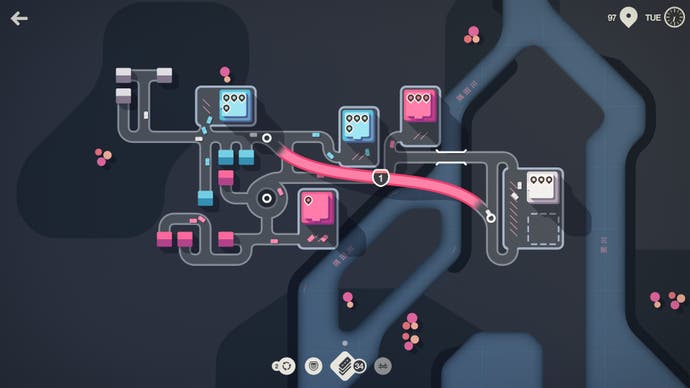
The genius is that you can never do this for very long. Because philosophically you want to stop doing it and find more satisfying ways of solving problems as soon as possible, certainly. And because those homes and businesses pop up where they want and mess with your plans anyway. And some cities have mountains that hem you in unless you have tunnels, and some cities have rivers that require bridges to cross, and maybe you're light on bridges. You get new pieces for your city every week, generally being given a choice of whether you want bridges, say, or roundabouts along with your extra road tiles. But you never really have enough. There's always too much to think about. The game is always too much of a jerk waiting to trip you up by creating supply and demand in awkward - distant places.
I have played this game for hundreds and hundreds of hours on iOS, where it was an Apple Arcade launch title. I keep playing because it's so maddeningly simple, and yet there's so much to learn. I learn when to save my bridges, say, or how to deal with a difficult city terrain. I learn how to use motorways as a sort of municipal hypertext that allows me to create shortcuts over snarls. The motorway as hail mary. And I learn how to maximise ghost home usage, and I learn that the deepest secrets involve building roads where you don't need them - it can work as an area denial tactic for spawning businesses and homes - and rebuilding cities as they get larger, ripping stuff up and starting again, cutting out old tangles, plucking out roundabouts (still new and I'm still getting my head around them) and aiming for nice straight lines where possible.
It's a great game because it's complex and challenging and it has a kind of awkward personality, always shoving you to step past your comforts and deal with something you really don't want to deal with. It's a great game because you can learn something new every time you play it, and there is expressiveness in its form of play. It's a great game because of the range of cities to experiment with, and the daily and weekly challenges that quickly become compulsive. It's a still a great game on PC, because it has a range of control methods. I was a bit worried about this, because nothing is going to beat the feeling of drawing roads with a flighty dab of the finger, even if some players found moving between the iOS version's build and delete modes a bit fiddly. On PC you can use a controller - I found I was a bit too clumsy for this - or you can use a mouse, with one button to lay roads and one to delete. It felt very natural from the off.
But it's one of the best games I've ever played for deeper, and perhaps slightly woolier reasons. Being honest, I am at something of a loss to explain just why I love Mini Motorways as thoroughly as I do, at a loss to explain why it seems to touch my soul a bit.
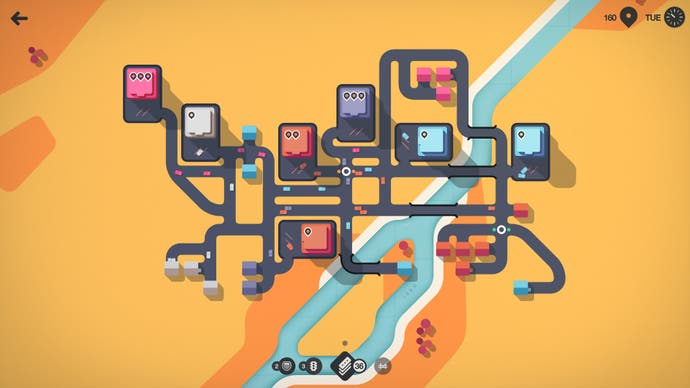
I love the connection it grants you with the great cities of the world, so I love this as a way to learn about places like Dubai and Mexico City, but also to relearn about places like Los Angeles, which I thought I knew pretty well. I love the unforced beauty of this thing, too, nothing in life and games so beautiful, I sometimes think, as a completed Mini Motorways city - completed as in: I died - with its endless fractal complexity, that kind of zinging suspended tension in the arms of the roadways that you get in the frozen storm of a Jackson Pollock. The odd truth is I get such happiness from just looking at this game, I don't even need to play it to have a good time.
And speaking of tension, I guess cities are a pretty big concept for a game to tackle - for anything to tackle. Hundreds of games in, and Mini Motorways seems to say everything and nothing about cities: it is gloriously tricksy in this way. At times the game seems to be prompting me to think about the way that we are often alone together in cities - this can be awful, but it can be wonderful too; I think it's what a lot of people missed quite keenly during Covid: the anonymous bustle of a coffee shop or public library. It makes me think about what the great Jonathan Gold said about LA, that rather than being a melting pot the city is a place where cultures come together even as they retain their identities, forming an intricate human richness he referred to as "a glittering mosaic."
At times the game seems to prompt me to think beyond cities, about how the body is all these different systems, working alongside one another and impacting one another - the nervous system, the endocrine system. And at other times it makes me think about how some things just need to be - cities and groups of people and movement and busy-ness. And the best we can do is rush along next to it all and try to keep it all going a bit longer. Cities: they're never really done.
And then at times it's not cities at all - not real cities, or bodies, or anything else. It's just hubs and spokes. Peach and mint. The tweeting and purring and chiming and puttering. I love this game because it doesn't say much for itself, but it encourages you to constantly think about what you've created. And maybe that's where insight begins - insight and the steady reconsidering of things.
